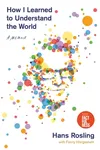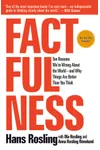Picture a Swedish professor who turned dry statistics into spellbinding stories—meet Hans Rosling! A physician, statistician, and global health guru, Rosling captivated audiences with his dynamic data visualizations and a mission to shatter myths about the world. His book Factfulness and the Gapminder Foundation transformed how we see global progress, blending optimism with hard facts.
With a knack for making complex data dance, Rosling’s TED Talks and presentations inspired millions to embrace a fact-based worldview. His legacy? A call to question assumptions and celebrate humanity’s strides, all while keeping it real. Let’s dive into the life of this data visionary!
The Making of Hans Rosling
Born on July 27, 1948, in Uppsala, Sweden, Hans Rosling grew up in a modest household, his curiosity sparked by tales of global exploration. He studied medicine at Uppsala University, later earning a Ph.D. in public health. His early career took him to Mozambique, where he investigated a mysterious paralysis outbreak, honing his knack for uncovering truths in data. This blend of compassion and analytical rigor set the stage for his global impact.
Rosling’s time in Africa shaped his perspective, revealing stark gaps in how people perceived global development. He returned to Sweden, teaching at Karolinska Institutet, but his heart was set on bridging those gaps through education and innovation.
Hans Rosling’s Unforgettable Contributions
Rosling’s most famous work, Factfulness (2018), co-authored with Anna Rosling Rönnlund and Ola Rosling, is a love letter to data-driven clarity. The book dismantles ten common misconceptions about the world—like the idea that it’s only getting worse—using vivid charts and a warm, witty tone. It’s a guide to thinking critically and embracing progress without rose-tinted glasses.
Through the Gapminder Foundation, founded in 2005, Rosling pioneered tools like Trendalyzer, which turned static numbers into animated, interactive visuals. His TED Talks, watched by millions, brought these tools to life, showing how child mortality plummeted and incomes rose over decades. His style? Part teacher, part storyteller, always grounded in facts but delivered with infectious enthusiasm.
Rosling also contributed to global health policy, advising organizations like the World Health Organization. His work wasn’t just academic—it was a rallying cry to replace fear with curiosity, making data accessible and, dare we say, fun.
Why Hans Rosling Matters
Hans Rosling’s impact transcends academia. He reshaped how policymakers, educators, and everyday people understand global trends. By debunking myths—like the oversimplified divide between “developed” and “developing” nations—he fostered a more nuanced, hopeful view of the world. His tools and talks empowered millions to question narratives and seek truth in numbers.
Even after his passing in 2017, Rosling’s legacy thrives through Gapminder and Factfulness, inspiring data literacy and optimism. In a world of polarized debates, his call for clarity and curiosity remains a beacon for better decision-making.
About Hans Rosling
- Born: July 27, 1948, Uppsala, Sweden
- Key Work: Factfulness (2018)
- Founded: Gapminder Foundation (2005)
- Awards: Named one of TIME’s 100 Most Influential People (2012)
Snag Factfulness or watch a Hans Rosling TED Talk to dive into his world of data-driven wonder! You’ll never look at numbers the same way again.

